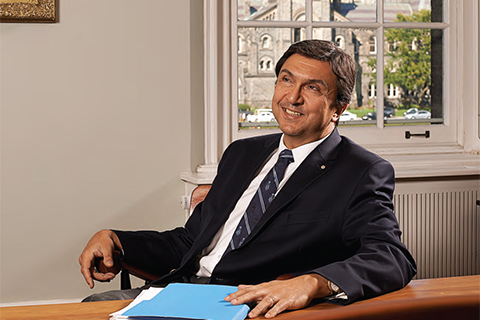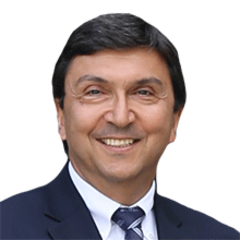The founding charter of the University of Toronto calls for the “education of youth… in the various branches of science and literature.” However, I doubt that John Strachan and his associates who helped establish U of T ever imagined that “literature” would now be taught here in more than 40 languages!
Today, as a field of scholarship, the humanities at U of T include not only the languages and literature, of course, but also philosophy, history, religion, anthropology, the classics and the visual and performing arts. U of T’s humanities departments also figure prominently in such interdisciplinary teaching and research centres as the Aboriginal Studies Program, the Centre for Ethics, and the Institute of Communication and Culture at University of Toronto Mississauga, among many others.
Enrolment in our humanities courses has soared more than 80 per cent since 2000. I believe that’s indicative of the excellent reputation of humanities scholars at U of T, the breadth and depth of courses available, and our world-class libraries. But one might still ask more generally: What draws students to the humanities in an era when science and technology are so prominent?
I believe the enduring appeal of the humanities lies in their encouragement of clear, critical and imaginative thought. In a world of shrinking distances and global competition, the humanities teach us much about bridging cultures and negotiating the often difficult terrain of human relationships. Many of our greatest societal challenges, not surprisingly, have a profoundly human dimension. The debate over global warming, for example, centres on climate science and economic implications, but it also raises thorny questions about individual ethics and the responsibility of developed versus developing nations.
This is why successful societies need leaders who understand humanity broadly. To name just three exemplars from among countless graduates: Adrienne Clarkson, a renowned broadcaster and former Governor General of Canada, Ted Rogers, the visionary president and CEO of Rogers Communications, and Anne Golden, the dynamic president and CEO of the Conference Board of Canada, all earned arts degrees at U of T. Tony Comper, recently retired as president and CEO of BMO Financial Group, studied English at U of T – not business. Mr. Comper values the humanities for their diversity and has said that “one should never underemphasize the quality of the educational experience in many different disciplines.”
In short, the humanities are at once timeless, evolving and essential. We are fortunate that so many donors have been drawn to these sometimes undervalued disciplines. Two recent donations bear special notice. Five years ago, humanities at the University of Toronto received a magnificent gift of $15 million from the Honourable Henry N.R. Jackman, then chancellor of U of T. Mr. Jackman’s gift was double-matched by the university to create a $45-million investment, which helped establish the largest endowed program in the humanities at any Canadian university.
Now, Mr. Jackman has raised his sights even higher. Earlier this year, he donated an additional $15 million, triggering another $45 million in support for the humanities. This outstanding commitment will enable U of T to further strengthen humanities education and research in many important ways.
Mr. Jackman’s gifts have made an immeasurable contribution to the study of the humanities at U of T. They have also enhanced public life in the city – through the Jackman Program for the Arts. In 2005, to cite just one example, the program brought together writers, filmmakers, musicians, professors, critics and many others for Voicing the Arts, a wonderful three-day public conference on the arts and the City of Toronto.
Former U of T president James Ham once described the university as a series of concentric circles. He placed the humanities in the central ring because, he said, they define the shape of civilization. The humanities were the beating heart of a U of T education 25 years ago when Jim Ham was president and, with the visionary support of Mr. Jackman and others like him, they will continue to play a central role for centuries to come.







No Responses to “ The Innermost Circle ”
It was a great pleasure to read President David Naylor’s column about the role of the humanities at U of T. I have a Latin background, but I studied and lived in Canada for almost two decades, which constituted for me a humanistic experience, both in the academic and existential senses. Nowadays I am self-employed, and teach English as a Second Language.
Dr. Naylor points out that “the humanities teach us much about bridging cultures and negotiating the often difficult terrain of human relationships.” I would add that, with respect to languages at least, this is a double-edged sword. With language we can build relationships, but we can also destroy them.
Iraque Ribeiro De Melo
MDiv 1986
Curitiba, Brazil